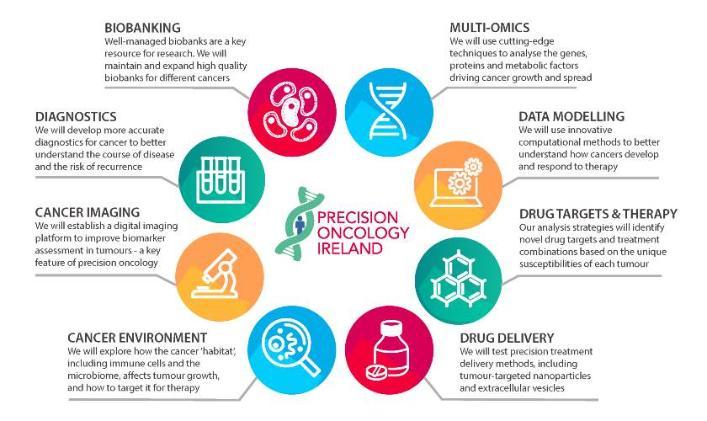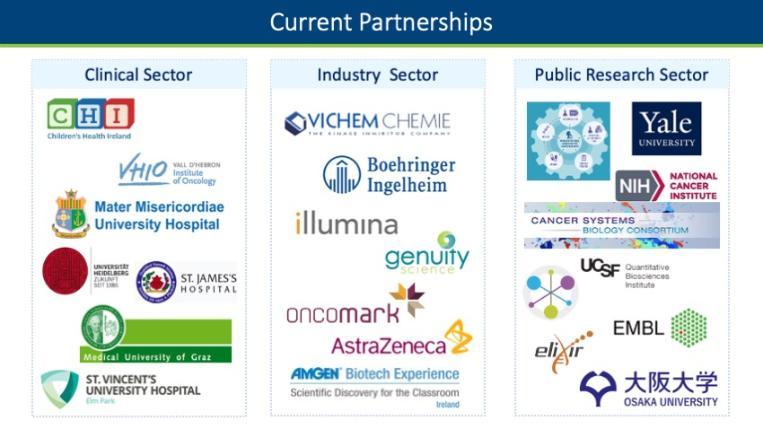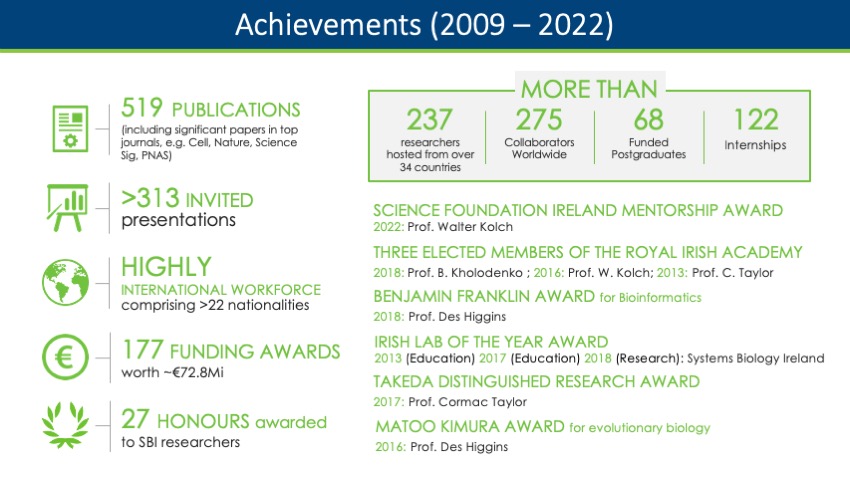> Visit UCD Research Spotlight on New Health Technologies
Established in 2009 under the direction of Professor Walter Kolch and Professor Boris Kholodenko, SBI has been leading the digital revolution towards accessible Precision Medicine for all.
For the past two decades biology and medicine have been morphing into data driven sciences. The arrival of genome sequencing in the clinic has shown the importance of data analysis and what quantum leaps can be made based on it. Presently, other ‘omics’ technologies (transcriptomics, proteomics, and metabolomics) are not far away from introduction into clinical labs.
First Digital Twin Model in clinical trial
In what is being hailed as a “milestone achievement,” a mathematical modelling system (digital twin model) developed by SBI is being used as a basis for treating pancreatic cancer patients in a Phase II clinical trial in the United States.
The mathematical model was originally published in Cell Systems in 2018 and predicts drug combinations which work to inhibit cells with RAS mutations found in cancer.
“The model itself is a next generation dynamic model that allows the simulation of complex biological effects arising from the interplay of genetic mutations, biological network context, protein modifications, and protein structures,” explained Professor Boris Kholodenko, senior author of the Cell Systems study with Professor Kolch.
If proven successful against pancreatic cancer, this clinical trial could lead to extensive applications in other RAS-mutant cancers, such as colorectal and lung cancer. Read more about the trial, which arose partially from work under a Science Foundation Ireland Investigator grant (Professor Kolch) and research funded by the National Institutes of Health (NIH) USA (Professor Kholodenko).
Professor Walter Kolch is a leading international proponent of Precision Medicine who originally trained as a clinician and subsequently worked in the pharmaceutical industry, before dedicating himself to research. In addition to co-founding the groundbreaking SBI centre at UCD, he has played a central role in the development of precision oncology and medicine policy and funding at national and international level, particularly through his leading involvement in pan-European strategic initiatives including Coordinating Action Systems Medicine, Infrastructure for Systems Biology Europe, and the ELIXIR research infrastructure for life science information.
He is joined on the leadership bench of SBI by Professor Boris Kholodenko, who is a Full Professor of Systems Biology and Director of Computational Modelling at SBI.
Computational modelling drives Precision Medicine
“To understand all the data we can generate nowadays about a patient, we need more than conventional data analysis. We need computational models of the data, which allow us to interact with the data, interrogate them and do bespoke analyses on them,” says Professor Kolch.
Genome analysis is only one example where computational models drive clinical progress. Another example is imaging, where artificial intelligence (AI) models allow us to extract deep biomedical knowledge from images. “For instance, histopathology images analysing the tumour microenvironment allow us to understand why some patients respond to immunotherapies but others do not.”
We are spinning out a company that will deploy our digital twin technology for introducing personalised patient simulations into the drug discovery and development process from the beginning.
— Prof Walter Kolch.
 Since its launch, SBI has gained national and EU funding to coordinate or contribute to over 1700 projects under its research brief that realise concept development through to translation and application, in collaboration with industry and other partners. One such programme led by SBI is Precision Oncology Ireland – the largest cancer research programme in Ireland – which unites the efforts of five universities and associated hospitals, six cancer charities and seven industry partners.
Since its launch, SBI has gained national and EU funding to coordinate or contribute to over 1700 projects under its research brief that realise concept development through to translation and application, in collaboration with industry and other partners. One such programme led by SBI is Precision Oncology Ireland – the largest cancer research programme in Ireland – which unites the efforts of five universities and associated hospitals, six cancer charities and seven industry partners.
Visit Precision Oncology Ireland
SBI runs multiple large scale, international projects and training programmes. See more below.
Pioneering precision approaches in cancer research
 “SBI’s philosophy is that we need to fully understand not only what but also whom we want to treat. When engineers build complex machineries, such as cars, ships or airplanes, they first build a computer model. They test drive the model, they crash it, they fix it, and they improve it on the computer – all before they actually build it. SBI is applying this concept to biomedicine.”
“SBI’s philosophy is that we need to fully understand not only what but also whom we want to treat. When engineers build complex machineries, such as cars, ships or airplanes, they first build a computer model. They test drive the model, they crash it, they fix it, and they improve it on the computer – all before they actually build it. SBI is applying this concept to biomedicine.”
The centre has pioneered the methodology of constructing computer models of patients, so-called ‘digital twins,’ so that every patient can be analysed and understood, the best therapies can be designed and tested out in computer simulations of their digital twin. As a result, real patients can be treated with individually tailored therapies that are best for them.
“Currently, we are developing the methods for the digital twin modelling. A big boost to this effort was the funding of the Precision Oncology Ireland (POI) consortium that SBI is leading, with the goal to bring modern technologies to the patient. It is a first big step towards uniting Irish cancer research efforts and also towards the digital twin models,” says Professor Kolch.
Learn more about SBI’s world leading team.
What’s next for SBI?
“SBI’s path is clear. We have proof-of-principle for our Digital Twin Models. One model is in a clinical trial in the US, and a further clinical study in Ireland is scheduled to commence this year. We now really want to test drive Digital Twin Models in the clinic to show their value in enabling precision medicine.”
SBI is also on track to make Digital Twin Models available for pharmaceutical industry to find better drug targets faster and cheaper, by reducing the high and expensive attrition rate that plagues the sector.
“For this, we are spinning out a company that will deploy our digital twin technology for introducing personalised patient simulations into the drug discovery and development process from the beginning. This will allow us to develop drugs for patients rather than just for targets,” says Professor Kolch.
 More about SBI
More about SBI
Systems Biology Ireland (SBI) specialises in cellular signal transduction investigation with a particular focus on development of new diagnostics and treatment strategies for diseases. The centre has expertise in:
- Drug target and biomarker discovery
- Patient stratification and sub-population characterisation
- Combination therapy prediction and screening
- Protein-Protein interaction profiling
- Computational network inference and modelling
- Dynamic mechanistic disease models
SBI Projects
SBI actively sources and applies for new streams of funding within its research brief. We aim not only to realise the development of concepts, but to actively promote translation and application through collaborations with industry and other partners. The centre has built partnerships across disciplines and sectors contributing their expertise to over 170 projects to date.
International Programmes
- The SALAMA Study: an Irish-Tanzanian partnership in childhood leukaemia genomics which is working to define the molecular landscape of paediatric and adolescent leukaemia in Tanzania for the first time.
- CLARIFY: A Horizon 2020 programme combining the expertise of partners from 5 different European countries to develop an innovative platform that will support the decision-making of medical doctors to improve the care of cancer survivors.
- COLOSSUS: A Horizon 2020 Research and Innovation action which brought together 14 partners from across Europe to provide new and more effective ways to classify patients with a specific subtype of metastatic colorectal cancer and to develop new treatment options for them.
- ERACoSysMed “OxyUC” which brought together 4 European partners to facilitate promotion of personalized prevention, diagnostics and treatment regimens for ulcerative colitis patients based on an understanding of the individual micro-environmental features of their disease.
- ASSET: An FP7 Health programme which brought together 8 Partners from 12 European countries to deliver new diagnostics and drug targets for childhood cancers.
- PRIMES: An FP7 Health programme which brought together 14 Partners from 7 European countries, Australia, and Canada to deliver new insights into the role of the KRAS oncogene in cell transformation and colorectal cancer.
National Programmes
- CMAP: A national infrastructure platform for comprehensive molecular analysis underpinning chemistry, the bioeconomy, and precision oncology research: from molecules to microorganisms and humans.
- BREAST-PREDICT: A country-wide collaboration funded by the Irish Cancer Society focusing on how best to treat individual breast cancer patients, according to the particular characteristics of their own cancer.
International Training Networks
- TOPMed10: an EU co-funded Marie Skłodowska-Curie (MSCA) Fellowship Programme focused on training the next generation of leaders in Personalised Medicine
- DevelopMed: an International Training and Career Development Fellowship Programme offering prestigious Precision Oncology Fellowships to experienced researchers at the early stage of their career
Visit Systems Biology Ireland